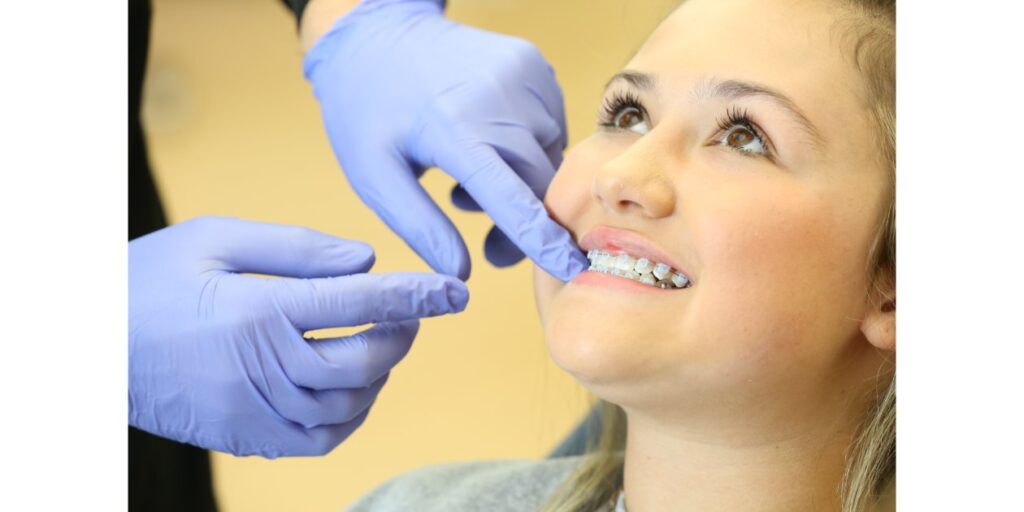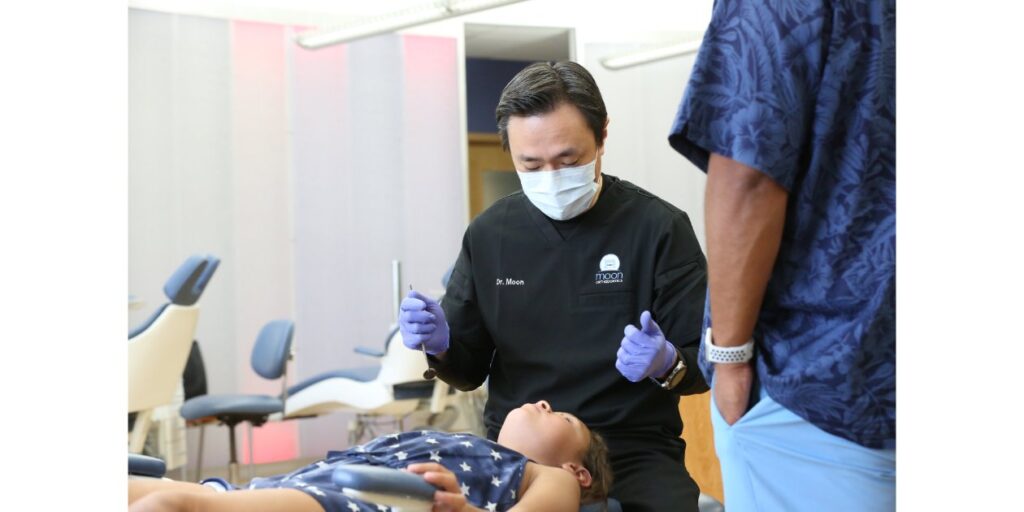Do you know how dentists and orthodontics work with one another? Do you even know how they’re different? Today, the Moon Orthodontics team wants to explain how these professionals collaborate and answer the question: Do dental check-ups help with orthodontic treatment?
Understanding the Difference
Before looking into the ways dental check-ups assist our process, let’s better understand how orthodontists and dentists compare and contrast one another.
- An orthodontist (like our own Dr. Moon) identifies, prevents, and resolves dental and facial irregularities, with the most common focus being on the treatment of misaligned teeth or jaws. Usually, braces and aligners are utilized.
- A dentist serves as a general provider, akin to a primary care physician in the wider medical field, whereas orthodontists are specialists in particular conditions. Dentists will provide an array of options for treatment, including conditions like tooth decay, gum disease, and other oral infections. The most common solutions for dental problems include procedures like dental cleanings, fillings, and extractions.
In many cases, a dentist is the one who refers the patient to our office. Here are a few problems that will usually mean an orthodontic referral:
- Malocclusion
- Impacted Teeth
- Crowding
- Crooked Teeth
- Spacing Issues
- Jaw Misalignment
Our treatment process is typically a collaborative one between you, our doctors, and your dentist. Working together helps to ensure you have comprehensive orthodontic care.

Treatment Options
In our office, we offer the following treatments—for kids, teens, and adults:
- Invisalign is the most subtle form of treatment for tooth alignment. We create a 3D model to ensure the fit is perfect for the series of aligners you’ll wear during this process. We also proudly offer Invisalign for Teens, which has special qualities fit for this age group.
- Metal braces are classic, highly durable, and effective. They are great for kids and adults, and tend to be the most economic option overall.
- Clear braces serve the same purpose as the metal alternative, but they match your tooth color, creating a less obvious effect. They can be more delicate due to their materials.
How Dentists Help
Visiting your dentist regularly, with or without braces or aligners, is crucial to overall oral health. They don’t perform orthodontic adjustments themselves—for example, we’ll be the ones to tighten your braces or replace a broken wire—but they can help us monitor progress and keep an eye out for damage.
These are the other key ways these appointments help the treatment process:
- Additional Attention: Your dentist can perform x-rays, take photographs, and create dental impressions, which are all additional tools to help assess how well your teeth are shifting into their new positions and whether adjustments are warranted.
- Professional Cleanings: Most regular visits to dentists include thorough cleanings. For individuals with braces, this is especially important. Many will find maintaining cleanliness difficult with these appliances, and proper hygiene prevents issues such as cavities and gum disease.
- Preventing Complications: Dentists identify and address potential issues early on, like the ones listed above. They can interfere with orthodontic treatment, and resolving them as early as possible helps ensure treatment progresses smoothly.
- Educating Patients: In addition to these factors, dentists help to educate patients on proper oral care practices. With this additional education, our patients can take better care of their teeth and braces.
- Collaborative Treatment Planning: Sometimes, certain interdisciplinary treatments mean creating a broader plan for both orthodontic treatment and general dental care if it’s seen as necessary and beneficial to the patient. Other professionals who might play a role are periodontists (gum health) and oral surgeons.
- Management of Dental Issues: This one may seem obvious, but dental problems that arise during your orthodontic treatment might require a different level of attention. Other problems include broken brackets, loose wires, or other emergencies. Your dentist might be able to intervene before we can and help to maintain the integrity of your appliance.
- Post-Orthodontic Care: After your treatment is finished, dentists continue to play a role in your ongoing health. They can provide follow-up care, including retention strategies, and monitor any changes in oral structures.
An Allstar Team
So, as you can see, your dentist will play a huge role in your time with us at Moon Orthodontics! It’s important that you maintain appointments with us both. We both care about your oral health and want your smile to be the best it can possibly be and working together, directly or indirectly, helps make this happen. If your dentist has mentioned orthodontic treatment as an imminent option, or if you’re simply curious about it, please reach out to our Overland Park or Olathe office at (913) 354-7566. We can’t wait to work with you!
 Free Consult
Free Consult

